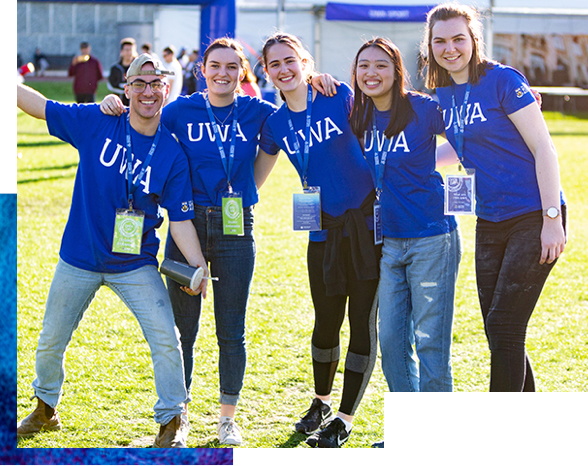Postgraduate
Master of Biotechnology
Contact us
Address
Student Central
The University of Western Australia (M355), 35 Stirling Highway, Perth, Western Australia 6009
Telephone
131 UWA (131 892)
International
(+61 8) 6488 1000
Hours
Frequently asked questions
Events you may be interested in
Show more eventsCareers and further study
Explore the career opportunities available to you.
Career Pathways
You can find career opportunities in academia, through either a higher degree or research/teaching post. The commercial sector also offers opportunities, where the mix of analytical, scientific rationale and business skills will see you well placed within selection criteria for biotechnology industries. Core business training will also give you a full understanding of idea development into spin out companies, and as such, biotechnology start-up ventures are a likely destination for some graduates. Governmental and non-governmental organisations also offers opportunities, for fields such as environmental monitoring, legislative development and advisory bodies concerned with biotechnology development.
Master of Biotechnology graduates will gain a range of skills which will open various career opportunities.
Some international, Australian and WA-based companies and institutions include:
- Biotechnology companies (e.g. Ozgene, PYC Therapeutics, Dimerix, ULUU, Novozyme, IDT Australia, Life Cykel, Qiagen, Roche)
-
Pharmaceutical/ medical device companies (e.g. CareDx, CSL, Pfizer, Abbvie, GlaxoSmithKline)
-
Agricultural breeding companies (e.g. Australian Grain Technologies, Intergrain)
-
Molecular diagnostics laboratories (e.g. Pathwest, Safe Work Laboratories, Precision Oncology, Mater Pathology)
-
Research Centres (e.g. Commonwealth Scientific and Industrial Research Organisation (CSIRO), Telethon Kids Institute, Centre for Invasive Species Solutions)
-
Provisioners of scientific instrumentation (e.g. Thermo Fisher Scientific, Westlab, LabGear Australia)
-
Genetic counselling services (Government/State, e.g. WA Health)
-
Government agencies (Primary Industries and Regional Development)
-
World Health Organisation
- Top ranked universities around the world
Further Study
Fees and scholarships
Learn more about the fees that apply to you for this course.
Domestic Student Fees
For Commonwealth-supported places, student contribution amounts are charged by unit, based on area of study. For a fee estimate, go to the Fee Calculator and select “I want to price my units”. Fees are subject to annual indexation. Refer to the Handbook to identify the units required. More information on how fees are calculated.
Scholarships
Scholarships are available to students from a diverse range of backgrounds, including academic achievement, financial need, educational disadvantage, leadership and community service, artistic or sporting achievements, and being from a rural or remote area.
Cost of living
International Student Fees
Onshore international students are charged an annual course fee, charged per credit point at a rate dependent on the course in which the student is enrolled. Annual course fees are calculated based on an annual study load. Check the handbook to confirm the annual study load for your course.
Find out more about international student tuition fees and visit the fee calculator for the relevant course fees.
Fees are subject to annual indexation.
Scholarships
Scholarships are available to students from a diverse range of backgrounds, including academic achievement, financial need, educational disadvantage, leadership and community service, artistic or sporting achievements, and being from a rural or remote area.
Cost of living
Admission requirements
If you’re interested in furthering your career by studying this postgraduate course, find out the admission details below
Admission Requirements
(a) a Bachelor of Science, or an equivalent qualification, as recognised by UWA;
and
(b) the equivalent of a UWA weighted average mark of at least 50 per cent;
and
(c) met the prerequisite for the chosen specialisation
(2) For the Biochemistry and Molecular Biology specialisation an applicant must have—
(a) successfully completed intermediate units at a tertiary level in Biochemistry, or equivalent, as recognised by UWA; and
(b) successfully completed intermediate units at a tertiary level in Molecular Biology, or equivalent, as recognised by UWA
(3) For the Environmental and Agricultural Biotechnology specialisation, an applicant must have successfully completed Chemistry ATAR, or CHEM1003 Introductory Chemistry equivalent, as recognised by UWA
(4) For the Genetics and Genomics specialisation, an applicant must have successfully completed intermediate units at a tertiary level in Genetics, or equivalent, as recognised by UWA
(5) For the AQUAtech specialistion an applicant must have successfully completed Chemistry ATAR, or equivalent, as recognised by UWA
(6) For the Synthetic Biology specialisation an applicant must have successfully completed intermediate units at a tertiary level in Biochemistry and Molecular Biology or Genetics, or equivalent, as recognised by UWA
Ranking and Selection Process
English competency
English is the language of instruction and assessment at UWA and you will need to meet the English language requirements of the University to be eligible for a place.
Minimum overall IELTS score of 6.5, with no band less than 6.0.
How to apply

Ready for the next step?
Find out how to apply through our simple online application process.
We'll guide you through our entry requirements, admission pathways available to you and application deadlines for your chosen course.
We can’t wait for you to join us!
Course details
About the course
This is a signature program that set us apart from other universities by offering a thorough grounding in state-of-the-art biotechnology and combining this with training in enterprise and commercialisation. This includes developing the theory of genetics and molecular biology in parallel with skills training in practical techniques such as genomics, proteomics, metabolomics, recombinant DNA methods, and basic and advanced bioinformatics.
Quick details
- Available
- Perth (Crawley campus)
- Full-time
- Part-time
- On-campus
- Semester 1, Semester 2
- Please refer to the UWA Handbook.
- Postgraduate
- 71580
- 083859F
Course structure
Postgraduate coursework degrees and combined (coursework and research) degrees comprise a number of units. Refer to the course structure for more information.
This course:
- offers up-to-date instruction in biotechnology in combination with training in enterprise and commercialisation
- utilises the expertise of world leading research staff in Science and in the UWA Business School – along with Business ‘Angels’ and mentors in biotechnology spin-outs
- has a unique set of specialisations
- has close working links with industry, both public and private
Flexibility
We understand that life is busy. That's why our postgraduate courses are designed so you can balance your work and studies. Our flexible postgraduate experience includes the opportunity to study part time, a range of units that are taught after hours, and the option to learn via intensive units. Ask our Student Central team for advice on choosing the right postgraduate route for you. Find out more here.
Bayliss Building

Cutting-edge facilities enable world-class research and study
Centre for Microscopy Characterisation and Analysis

Providing world-class microscopy and microanalysis facilities and expertise to publicly funded researchers and industry.


